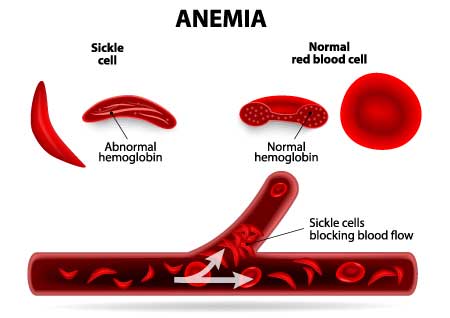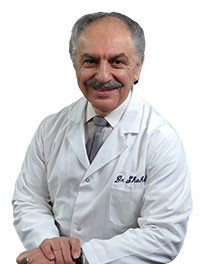Sickle Cell Anemia Treatment in Midland Park, NJ
What Is Sickle Cell Anemia?

Sickle cell anemia, a severe form of sickle cell disease (SCD), is an inherited blood disorder in which abnormal hemoglobin—a protein in red blood cells that carries oxygen throughout your body—causes red blood cells to become rigid, sticky, and crescent- or sickle-shaped. These misshaped red blood cells can become trapped in small blood vessels, slowing or even blocking blood flow and denying oxygen to parts of your body.
SCD is considered one of the most common genetic disorder in the United States and, while there is no cure for sickle cell anemia, treatment is available to alleviate symptoms of the disease and prevent further complications. To schedule a consultation with a healthcare practitioner in Midland Park who specializes in sickle cell anemia treatment, call (201) 806-6099 or contact Dr. M.T. Shahab online.
Sickle Cell Anemia Causes & Risk Factors

Sickle cell anemia is a genetic condition caused by a gene mutation that affects hemoglobin production. For a child to inherit sickle cell anemia, he or she must inherit the sickle cell gene from both parents.
There are other types of sickle cell disease which occur when a child inherits one sickle cell gene and one abnormal type of hemoglobin. In the event a child inherits one sickle cell gene and one normal gene, the condition is called sickle cell trait; sickle cell trait affects as many as 1 in 12 African Americans and is much less severe. People with sickle cell trait are healthy and free from sickle cell anemia symptoms, but they are lifelong carriers that can pass the disease on to their offspring.
While 60-80 percent of those who suffer from SCD are of African American descent, people with Indian, Middle Eastern, Hispanic and Mediterranean heritage are also commonly affected.
Sickle Cell Anemia Symptoms & Diagnosis
Sickle cell anemia symptoms typically arise at a young age and tend to be more severe than other forms of sickle cell disease. The most frequently reported symptoms include:
- Fatigue
- Anemia
- Pain crises
- Swelling of hands and feet
- Jaundice (yellowing of the eyes and skin)
- Frequent infections
- Fussiness
- Delayed growth
- Vision problems
If you suspect you or your child are experiencing signs of sickle cell anemia, it is important to meet with a healthcare practitioner. Your practitioner will conduct a physical examination, as well as review your medical history and symptoms thoroughly, to arrive at a sickle cell anemia diagnosis. A simple blood test that checks for hemoglobin S is routinely used to screen newborn babies in the hospital, but adults and older children can be diagnosed using the same test. If sickle cell anemia is suspected during pregnancy, your healthcare provider may recommend an amniocentesis to check amniotic fluid for signs of the disease.
If complications of sickle cell anemia have developed, other diagnostic tests may be necessary, including urine and blood tests, or imaging tests like a CT scan or ultrasound to detect organ damage.
Sickle Cell Treatment
The only potential cure for sickle cell anemia is a bone marrow transplant . This form of sickle cell treatment is typically reserved for severe cases in patients under the age of 16 due to the complexities and risks associated with the procedure.
Additional treatments for sickle cell anemia that focus on preventing complications and treating the disease's symptoms include:
- Medications like antibiotics (particularly penicillin) and pain relievers
- Sickle cell anemia medications, such as hydroxyurea to increase the amount of fetal hemoglobin in the blood to reduce pain and the need for blood transfusions
- Vaccinations to prevent common infections that arise due to lower immunity
- Blood transfusions to increase the number of normal red blood cells
- Experimental treatments, including gene therapy, nitric oxide therapy, and other drugs
A generation ago, children born with sickle cell anemia rarely survived to adulthood. With new treatments and therapies developed in the last 20 years, the prognosis for the disease is very different, and many people with sickle cell anemia are living longer, healthier lives.
If you suspect you or your child are experiencing sickle cell symptoms, It is important to meet with a healthcare provider experienced in sickle cell anemia treatment to help avoid potential complications, including stroke, organ damage, acute chest syndrome, leg ulcers, and blindness. To meet with a practitioner in Midland Park who can help you cope with the disease, call (201) 806-6099 or contact Dr. M.T. Shahab online.
Medwell Orthopedics & Functional Medicine for Men & Women
Address
33 Central AveMidland Park, NJ 07432
(201) 806-6099
www.BergenCountyDoctors.com
Hours
Mon:
8:00 am - 8:00 pm
Tue:
2:00 pm - 7:00 pm
Wed:
8:00 am - 6:30 pm
Thu:
8:00 am - 1:00 pm
Fri:
8:00 am - 6:30 pm
Sat:
9:00 am - 1:00 pm
Sun:
By Appointment Only


